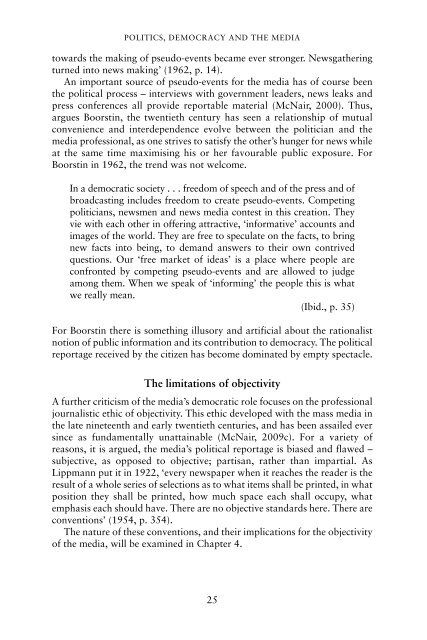20130412164339753295_book_an-introduction-to-political-communication
20130412164339753295_book_an-introduction-to-political-communication
20130412164339753295_book_an-introduction-to-political-communication
Create successful ePaper yourself
Turn your PDF publications into a flip-book with our unique Google optimized e-Paper software.
POLITICS, DEMOCRACY AND THE MEDIA<br />
<strong>to</strong>wards the making of pseudo-events became ever stronger. Newsgathering<br />
turned in<strong>to</strong> news making’ (1962, p. 14).<br />
An import<strong>an</strong>t source of pseudo-events for the media has of course been<br />
the <strong>political</strong> process – interviews with government leaders, news leaks <strong>an</strong>d<br />
press conferences all provide reportable material (McNair, 2000). Thus,<br />
argues Boorstin, the twentieth century has seen a relationship of mutual<br />
convenience <strong>an</strong>d interdependence evolve between the politici<strong>an</strong> <strong>an</strong>d the<br />
media professional, as one strives <strong>to</strong> satisfy the other’s hunger for news while<br />
at the same time maximising his or her favourable public exposure. For<br />
Boorstin in 1962, the trend was not welcome.<br />
In a democratic society . . . freedom of speech <strong>an</strong>d of the press <strong>an</strong>d of<br />
broadcasting includes freedom <strong>to</strong> create pseudo-events. Competing<br />
politici<strong>an</strong>s, newsmen <strong>an</strong>d news media contest in this creation. They<br />
vie with each other in offering attractive, ‘informative’ accounts <strong>an</strong>d<br />
images of the world. They are free <strong>to</strong> speculate on the facts, <strong>to</strong> bring<br />
new facts in<strong>to</strong> being, <strong>to</strong> dem<strong>an</strong>d <strong>an</strong>swers <strong>to</strong> their own contrived<br />
questions. Our ‘free market of ideas’ is a place where people are<br />
confronted by competing pseudo-events <strong>an</strong>d are allowed <strong>to</strong> judge<br />
among them. When we speak of ‘informing’ the people this is what<br />
we really me<strong>an</strong>.<br />
(Ibid., p. 35)<br />
For Boorstin there is something illusory <strong>an</strong>d artificial about the rationalist<br />
notion of public information <strong>an</strong>d its contribution <strong>to</strong> democracy. The <strong>political</strong><br />
reportage received by the citizen has become dominated by empty spectacle.<br />
The limitations of objectivity<br />
A further criticism of the media’s democratic role focuses on the professional<br />
journalistic ethic of objectivity. This ethic developed with the mass media in<br />
the late nineteenth <strong>an</strong>d early twentieth centuries, <strong>an</strong>d has been assailed ever<br />
since as fundamentally unattainable (McNair, 2009c). For a variety of<br />
reasons, it is argued, the media’s <strong>political</strong> reportage is biased <strong>an</strong>d flawed –<br />
subjective, as opposed <strong>to</strong> objective; partis<strong>an</strong>, rather th<strong>an</strong> impartial. As<br />
Lippm<strong>an</strong>n put it in 1922, ‘every newspaper when it reaches the reader is the<br />
result of a whole series of selections as <strong>to</strong> what items shall be printed, in what<br />
position they shall be printed, how much space each shall occupy, what<br />
emphasis each should have. There are no objective st<strong>an</strong>dards here. There are<br />
conventions’ (1954, p. 354).<br />
The nature of these conventions, <strong>an</strong>d their implications for the objectivity<br />
of the media, will be examined in Chapter 4.<br />
25
















